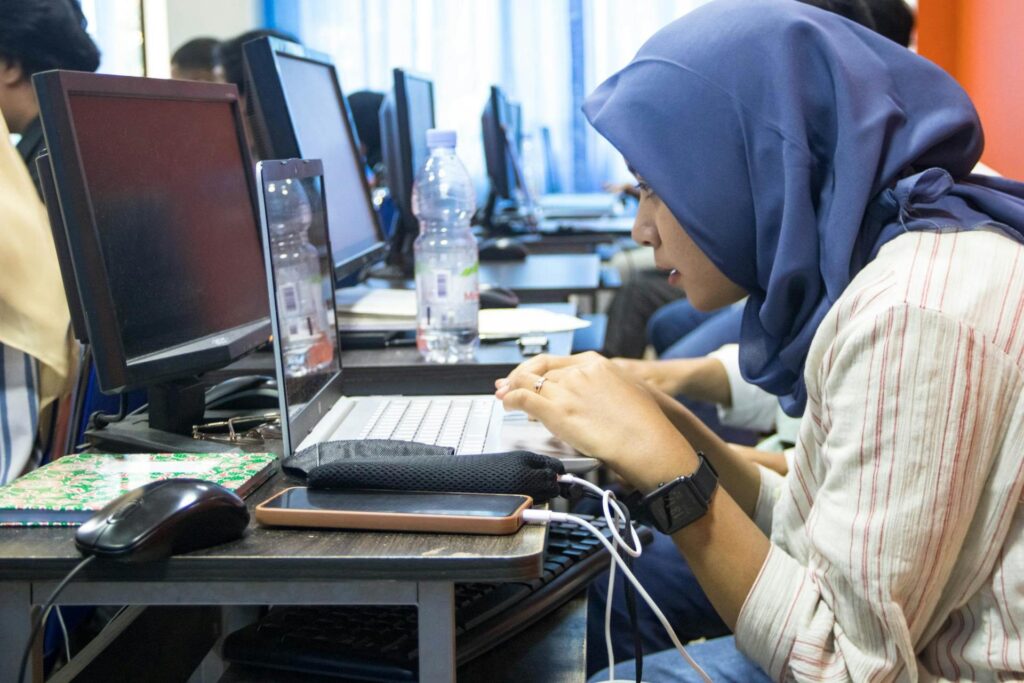The emergence of generative artificial intelligence has prompted a vast wave of global technological experimentation, backed by equally prolific sums of public and private sector investment.
This momentum is unfolding at a time of global uncertainty: shifting US foreign policy, rising US-China tensions, the ongoing war in Ukraine, and volatile economic conditions.
Right now, the Gulf states have a rare opportunity to act on the old adage: “Never let a good crisis go to waste.”
The UAE, Saudi Arabia and Qatar hold a significant geopolitical advantage. With strong relationships across both Western and Wastern powers, the Gulf states are well positioned to serve as global connectors in shaping the future of AI.
The Gulf nations have worked diligently to diversify beyond hydrocarbons, with technology, AI and data central to their visions. As such, AI may contribute as much as $135 billion to Saudi Arabia’s GDP by 2030, according to management consultants PwC.
This sum includes initiatives like Neom, the AI and sustainability testbed city, and renewed cloud infrastructure, such as Saudi Arabia’s $5.3 billion Amazon Web Services (AWS) investment.
Established institutions such as Mohamed bin Zayed University of Artificial Intelligence in the UAE also symbolise the tech ambitions of the region.
Now is the time to accelerate efforts, test strategies, reassess priorities and take decisive steps toward building truly sovereign capabilities in data and AI.
The following interrelated pillars outline the path to building a thriving ecosystem.
Innovation infrastructure
The Gulf needs to scale and deliver sufficient startups out of its incubators. Programmes such as Dubai Future Accelerators offer value by connecting startups with the government. However, such frameworks must be harmonised across the region to enable cross-border scaling.
Homegrown startups
Efforts must be stepped up to promote innovative companies, such as tech startups in fields like Arabic large language models (LLMs), robotics and climate technology.
Digital payments provider Bayanpay in Saudi Arabia and last-mile delivery company Fetchr in the UAE are leaders in homegrown innovation. Nevertheless, more supportive frameworks are needed to help more local talent thrive without overreliance on foreign experts.
Policy and regulation
The Gulf’s “lighter touch” regulation is a competitive advantage, but the framework needs to be fully coherent to local and global markets. The UAE’s AI Ethics Guidelines are a step in the right direction, but all regulatory frameworks should strive to be consistent and trustworthy to foster innovation across borders.
The Gulf nations have worked diligently to diversify beyond hydrocarbons, with technology, AI and data central to their visions
Talent and education
The Gulf countries have young populations, and that is a real asset. Training coders is a valuable move, as seen in the UAE’s goal to train 100,000 programmers, but the region also needs to do more to cultivate top-tier AI researchers, engineers, entrepreneurs and data scientists.
Educational institutions such as King Abdullah University of Science and Technology are advancing research, but more action should be taken to prioritise local expertise over dependence on international specialists.
Capital access
Despite the Gulf’s vast sovereign wealth reserves, only a fraction of overall investment reaches tech startups. This status quo is insufficient for meaningful transformation. Investment funds help, but more collaboration is needed to unlock early-stage capital.
Data and computing infrastructure
The region has abundant access to renewable energy supply and land; the next step is owning more of the computing stack. Investments by AWS and Google Cloud (in Qatar) show regional potential. The Gulf states must make the move from being cloud consumers to cloud builders.
Research excellence
The region’s AI research centres need to become truly globally competitive. The UAE’s Mohamed bin Zayed University of Artificial Intelligence produces world-class talent, but it needs more foundational research, as well as new research units to shape global discourse, not just adapt foreign technology.
Force multiplier
While each Gulf nation has made independent progress, deeper collaboration across states could significantly amplify the impact.
Shared infrastructure projects – such as regional supercomputing hubs – joint research initiatives focused on Arabic-language AI, climate tech, and harmonised regulatory frameworks could elevate the region’s global standing.
AI investment doesn’t just grow one sector; it sparks progress across many. The multiplier effect touches everything from logistics to tourism.
More than that, it opens the door to new jobs that didn’t exist, such as responsible AI leaders and prompt engineers. This shift requires a fundamental rethink of how the region educates, trains and prepares its workforce for the future of work.
Seizing opportunity
What is most critical now is timing. The world has reached a geopolitical inflection point, and the race for AI leadership is still wide open.
The Middle East has a remarkable chance to take leaps to redefine partnerships with global players, while strengthening internal capabilities and positioning itself not just as an adopter, but as an originator of data and AI innovation.
Now is the time for the UAE, Saudi Arabia and Qatar to turn up the heat on their ambitions and build truly data-driven economies, supported by robust, future-ready AI ecosystems.
An opportunity of this scale is unprecedented – and it must not be wasted.
Mark Breslin is a former chief AI officer in the UK’s FTSE 100. He has always worked at the intersection of emerging technology and business.



